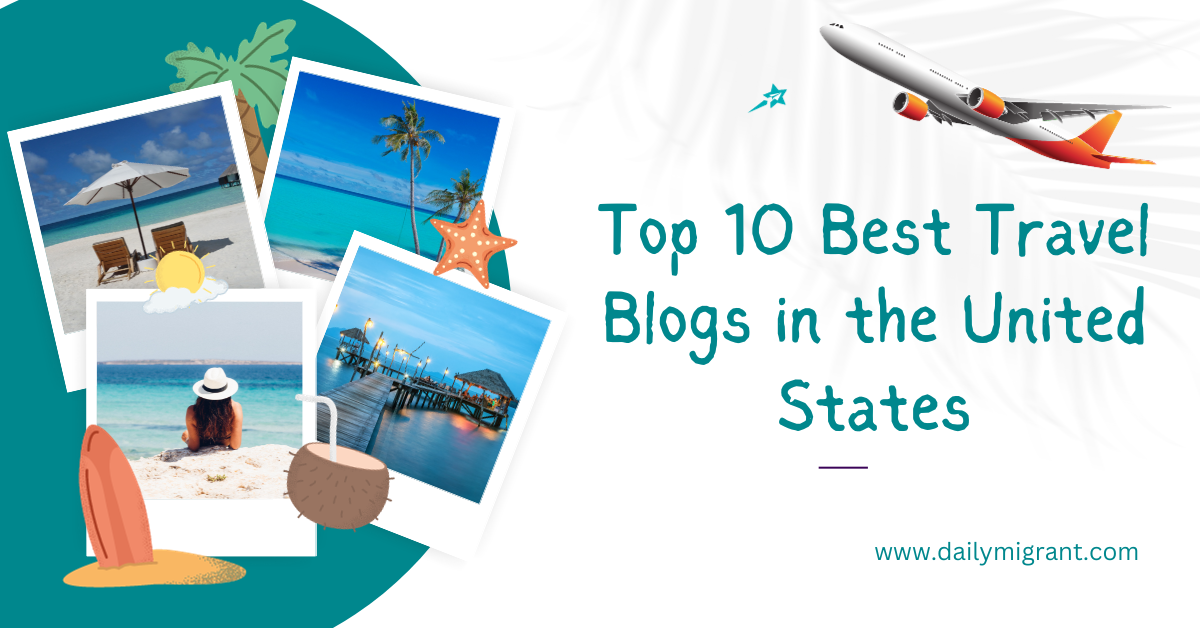Introduction
Many people are asking the question, How much does it cost to become a travel agent?
In this article on Daily Migrant, we will answer this question for you in detail.
Maybe you’re an avid traveler, or you enjoy exploring new locations, or you like getting yourself involved in anything that has to do with travel.
Naturally, every new venture demands a financial outlay, so you may have wondered, “How much does it cost to become a travel agent?”
When you consider becoming a travel agent, the answer to that question may be less or more than you initially know it to be.
Becoming a travel agent or making a living off of travel comes with many benefits such as flexibility, income potential, a passion for the industry, popularity, connections, and much more.
So, Being your own boss and having a passion for travel make for a very appealing career.
The travel demand is increasing to levels never seen before, even at the height of the sector in 2019.
This can be attributed to several variables, such as the relaxation of pandemic restrictions, heightened consumer confidence, and an unfulfilled longing to travel.
As a result, both seasoned and prospective travel advisers have access to more options than before.
The travel industry is ever booming and now is the perfect time to turn your passion for travel into a reality by becoming a travel agent.
While the initial investment may seem daunting, the rewards of helping others create unforgettable travel experiences and building a thriving business are well worth it.
Understanding the Costs of Becoming a Travel Agent

According to The Travel Franchise, Launching a travel agency involves several upfront expenses, including training, licensing, insurance, and marketing.
Here’s a breakdown of the costs you can expect to incur:
Education cost of becoming a travel agent
- A college degree in tourism or hospitality is beneficial but not mandatory.
- Online or evening courses can provide essential knowledge and skills.
- Costs vary depending on the program, ranging from £12 to £10,000.
Training cost of becoming a travel agent
- Consider specialized travel agency training to enhance your expertise.
- The International Air Transport Association (IATA) offers courses starting at £100.
- Reed Travel Exhibitions provides a range of courses starting at £12.
- The Association of Learning offers a year-long course for around £390.
Licensing cost of becoming a travel agent
- Depending on the holidays you sell, you’ll need specific licenses.
- ATOL (Air Travel Organiser’s Licence) costs £1,223 for small businesses.
- ABTA (The Travel Association) membership starts at £750 plus VAT.
- Travel Trust Association membership varies depending on the package.
Insurance cost of becoming a travel agent
- Protect your business with public liability and professional indemnity insurance.
- Costs vary depending on the type of insurance and your business needs.
Marketing cost of becoming a travel agent
- Utilize social media platforms for free or invest in paid advertising.
- Consider traditional marketing methods like print ads or local sponsorships.
- Allocate a budget for marketing based on your business goals.
RELATED: How To Become A Travel Influencer
Opportunities on How to Become a Travel Agent

There are several paths to becoming a travel agent, each with its own set of advantages and challenges:
- Independent Travel Agent:
Pros: Complete control over your business.
Cons: High initial costs, no guaranteed income, solo efforts.
- Host Agency:
Pros: Support and guidance from an established agency.
Cons: Less autonomy, the potential for conflicts with the host agency.
- Partnership:
Pros: Shared expertise and resources.
Cons: Potential disagreements, particularly regarding finances.
- Travel Franchise:
Pros: Ready-made business model, brand recognition, support network.
Cons: Franchise fees, adherence to franchise rules.
ALSO READ: 10 Steps on How To Become A Travel Nurse
The Travel Franchise: Your Gateway to Success
The Travel Franchise offers a comprehensive support system to help you establish and grow your travel agency:
- Membership Packages:
- Lite package: £2,995 plus VAT, includes training, ABTA bonding, website, software, marketing materials, and a partnership manager.
- Elite package: £14,995 plus VAT, includes all Lite package benefits plus higher commission share, access to Millionaires Retreat, a 5-day luxury overseas experience, and the Money Back Challenge.
- Entrepreneur and Supreme packages: From £29,995 plus VAT, designed for rapid growth, with extensive mentoring, marketing support, and higher commission earnings.
Ongoing Support:
- A dedicated partnership manager to guide you through the process.
- Access to a network of experienced travel professionals.
- Continuous training and development opportunities.
Independent Travel Agent vs. The Travel Franchise
You can start your career in the travel sector as an independent agent or through The Travel Franchise’s encouraging environment.
Every route has unique benefits and difficulties.
The Independent Travel Agent’s Path
You’ll have the freedom to create your own brand as an independent travel agent and build a clientele that shares your enthusiasm for exploring new places.
But with that entrepreneurial drive also comes the accountability of building your own systems and advertising plans.
The initial investment is frequently high, often more than £17,000, and includes things like website development, business registration, marketing materials, and continuous advertising costs.
Establishing a prosperous independent travel business demands commitment, tenacity, and in-depth knowledge of the constantly changing travel sector.
Without a proven track record or established brand recognition, attracting clients can be challenging.
You’ll need to actively network, build relationships, and consistently deliver exceptional customer service to establish a loyal client base.
Advantages of going through The Travel Franchise.
By utilizing the strength of an existing brand and offering a thorough support network, The Travel Franchise presents an alternative route.
You may immediately connect with a network of seasoned travel experts who can offer advice and mentorship by joining The Travel Franchise.
In addition, you’ll get access to special vacation offers, tested sales techniques, and pre-made marketing materials.
The Travel Franchise does away with the uncertainty and initial outlay of starting a business on your own.
The franchise fee, which usually ranges from £5,000 to £20,000, provides access to a global network of agents, full training, and continuous support.
This structured approach reduces the risk and provides a strong foundation for building a successful travel business.
ALSO READ: 8 Best Travel Jewelry Cases
Some questions and answers on “How much does it cost to become a travel agent?”
These are some questions and answers on “How much does it cost to become a travel agent?” gathered from Lovethemaldives.com
Is it expensive to become a travel agent?
The cost of becoming a travel agent can vary depending on the type of training and certifications you choose to pursue.
However, it is generally considered to be a relatively affordable career path.
Most aspiring travel agents in the US pay between $300 and $900 to complete their certificate programs.
Some online courses might cost closer to $200.
If you enroll in a four-year degree program in travel and tourism, you might pay as much as $50,000 or more in tuition, books, and fees.
Do you have to pay monthly to be a travel agent?
The vast majority of travel agents belong to host agencies, which offer back-office support and negotiate commission rates with suppliers.
In exchange for these services, agents typically pay a monthly and/or yearly fee plus a commission split with the host agency.
The exact amount of these fees will vary depending on the host agency and the agent’s business volume.
What are the operating expenses of a travel agency?
Travel agency operating expenses vary with the size and type of the agency. Common operating costs include:
- Fees and commissions:
These fees are paid to suppliers, such as airlines, hotels, and cruise lines, for booking travel arrangements for clients.
- Stationery and printing:
This includes the cost of business cards, brochures, and other marketing materials.
- Insurance:
Travel agents need to have liability insurance to protect themselves from potential lawsuits.
- IT and software:
Travel agents need access to a variety of software programs to manage their bookings, finances, and customer relationships.
- Marketing and advertising:
Travel agents need to market their services to potential clients. This can be done through a variety of channels, such as online advertising, social media, and print advertising.
- Staff wages:
If you have employees, you will need to pay their wages and benefits.
- Rent and utilities:
If you have a physical office, you will need to pay rent and utilities.
- Office supplies:
This includes the cost of pens, paper, and other office supplies.
- Professional and legal advice:
Travel agents may need to consult with professional advisors, such as accountants and lawyers, to ensure that they are complying with all applicable laws and regulations.
Do travel agents charge a fee in the US?
No, travel agents in the US typically do not charge a fee to clients.
Instead, they are paid commissions by partner agencies, such as airlines, hotels, and cruise lines.
The amount of commission that an agent earns will vary depending on the supplier and the product they are booking.
For example, agents typically earn a higher commission on cruise bookings than they do on airline ticket bookings.
How much money do I need to start a travel agency?
The amount of money you need to start a travel agency will vary depending on your business model and the size of your operation.
However, you can generally expect to need a few thousand dollars in startup capital to cover the costs of training, certifications, licensing, insurance, and marketing.
How do travel agents get paid in the US?
Travel agents in the US are paid commissions by partner agencies, such as airlines, hotels, and cruise lines.
The amount of commission that an agent earns will vary depending on the supplier and the product they are booking.
For example, agents typically earn a higher commission on cruise bookings than they do on airline ticket bookings.
Who pays travel agent fees?
The cost of using a travel agent is generally marginal, and often, they won’t charge you at all.
Much of their money comes from commissions that the hotels and wholesalers pay them.
In fact, many travel agents can actually save their clients money by negotiating better rates and packages than consumers could find on their own.
How much does travel expenses cost?
The average cost of travel can vary depending on several factors, including the destination, length of stay, type of accommodations, and activities.
However, according to a recent survey, the average cost of travel for Americans is $4,000 per year.
How do you maintain travel agency accounting?
It is important to maintain accurate records of your travel agency’s income and expenses.
This will help you to track your profitability and ensure that you are complying with all applicable tax laws.
Here are a few tips for maintaining accurate travel agency accounting:
- Record all of your income and expenses. This includes commissions, fees, rent, utilities, and other business expenses.
- Use a separate bank account for your business. This will make it easier to track your income and expenses.
- Reconcile your bank statements regularly. This will help to ensure that your records are accurate.
- Seek professional advice if you need help. An accountant
How do travel agents get paid?
Travel agent’s earnings are made up of a mix of salary, commission, and other incentives.
Their pay can fluctuate significantly from month to month or even annually.
Different destinations, seasons, suppliers, affiliates, or even how the booking is made, all factor into the percentage of commission that an agent takes home.
Can you live off being a travel agent?
Being a remote travel agent can be a great way to earn a living while giving you freedom and flexibility.
If you’ve ever felt the desire to travel abroad, working in the travel industry is a smart way to earn travel allowances from an employer while earning a paycheck.
Are travel agents in high demand?
Demand is projected to increase for travel agents’ expertise in recommending options to clients seeking personalized travel experiences.
People are expected to continue relying on travel agents for their advice on popular or unique destinations and for their ability to handle travel issues.
What is the daily life of a travel agent?
Travel agents spend most of their time at their desks, and the majority of these hours are spent dealing with clients, whether in person or over the phone.
The travel agency’s hours accommodate its clientele, so most agents work more than forty hours per week in a variety of shifts.
How are travel agents successful?
Every travel agent’s success relies heavily on their ability to communicate and form relationships.
Communication skills are not only needed to help your clients, they will also help you grow a network of contacts in the industry which will be a valuable source of support.
ALSO READ: Travel Security Tips To keep your Family and Properties Safe.
How can I be successful in the travel agency business?

7 Things Every Travel Agency Should Do to Become Successful
- Specialize:
Select a niche in which you are interested and able to become an expert.
This could involve traveling in style, on an adventure, or traveling with the family.
You can establish yourself as an authority in your industry and draw in specific clients by specializing.
- Give a personal touch:
Spend time getting to know your clients’ goals, inclinations, and worries rather than just making trip reservations.
Give them individualized advice, intimate knowledge, and continuous assistance during their trip.
- Maintain a high standard of quality:
Always strive to provide excellent customer service and exceed your client’s expectations.
This will help you build a reputation for quality and attract repeat business.
- Develop your sales skills while fostering trust:
Although salesmanship is crucial, it needs to be combined with sincere integrity and trust.
Keep your techniques non-pushy and concentrate on informing your clients about their trip possibilities.
Emphasize the value you offer rather than just the cost of the trip.
- Embrace the power of technology:
Use technology to your advantage by investing in travel agency software that can help you manage bookings, client data, and marketing campaigns.
- Explore untapped opportunities:
Don’t be afraid to think outside the box.
Look for new and innovative ways to offer travel experiences, such as voluntourism or culinary tours.
- Continuously refine and adapt:
The travel industry is constantly evolving, so you need to be willing to adapt and change.
Stay up-to-date on the latest trends and regulations, and be prepared to adjust your business model accordingly.
How do travel agents get clients?
You can use email marketing and social media to get the word out.
You can also attend events and trade shows in your local area.
Creating social media groups is a great way to attract clients looking for travel services who may live further away.
Conclusion
In conclusion, it can be a fulfilling and rewarding career to become a travel agent.
This is because it allows you to combine your passion for travel with your spirit for business or entrepreneurship.
We have given you many details to answer the question, “How much does it cost to become a travel agent?” in this article on Daily Migrant.
So, by carefully considering the costs and opportunities involved, you can make an informed decision about the path that best suits your goals and aspirations.





